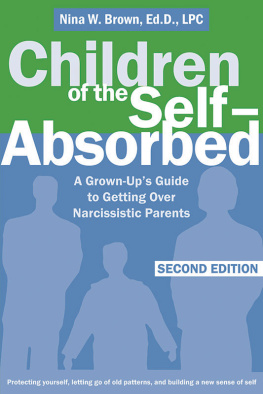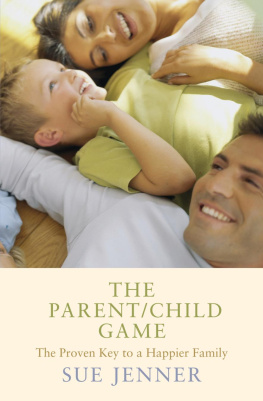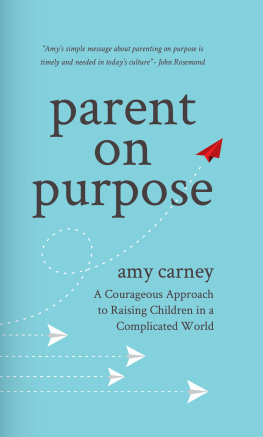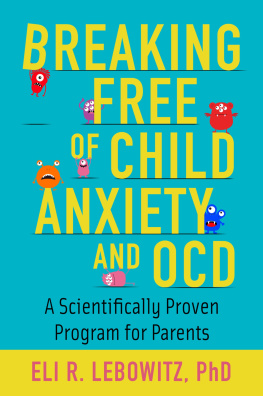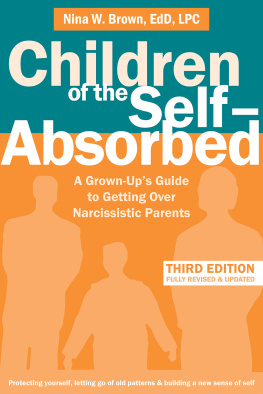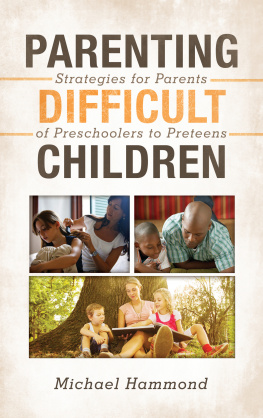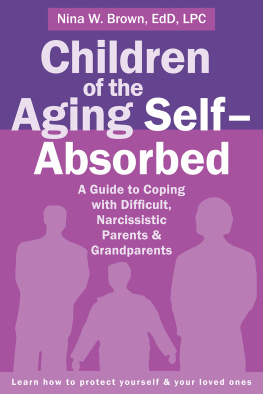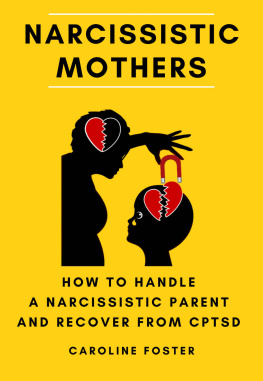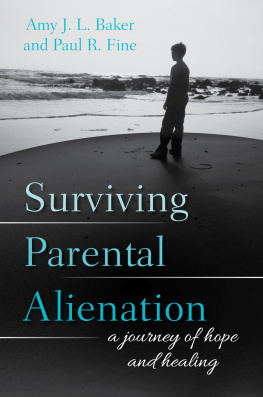Chapter 1
Infuriating, Critical, Demanding, and Unreasonable Parents
Below, is a composite message I derived from the ones received from readers of the first edition of this book. These statements, addressed to the self-absorbed parent, capture many of the feelings that grown-up children of these parents experience. Some address their mothers, and some their fathers. See if any of their words resonate with your experience or feelings.
Its all about you, and you make sure of that. Your wants, needs, and demands are always the main focus. Everything must be done your way, or its not acceptable. You never stop to consider that others have rights too. In your eyes, you know what is best and are always right, and I have to fall in line or incur your wrath, displeasure, and disappointment.
You are completely self-serving. You use every situation to fulfill your needs. You are blind to others needs, deaf to their emotions, and expert at manipulation. You work hard to trigger my guilt, sadness, rage, and shame, and to make sure that I am exactly what you want me to be. You constantly berate, blame, and criticize me, and I am always miserable around you.
I want to please you, but I never seem to be able to. You are like a hurricane. I know you are coming so I prepare for the damage you can do, but my preparations are in vain. After you leave, I am left with the residual emotions to clean up, while you move on not knowing or caring about the destruction you cause to me or to anyone else.
How I long for some sign that you like and love me, but in all my years with you, Ive never felt this, and this lack affects me deeply. As I was growing up, you never showed any understanding of what I was feeling, and when I tried to make you understand, you either ignored or minimized my feelings or became angry and said that I was ungrateful or disrespectful for criticizing you.
Now that I am an adult, I find that I still long for your love. I know that you cannot be different, but that doesnt take away the yearning for a more satisfying and loving relationship.
What most readers have in common is an awareness that their childhood experiences are continuing to exert unwanted and negative effects on them as adults, and that they want to do something to moderate or eliminate these. The first edition of Children of the Self-Absorbed described the actions and attitudes of destructive narcissistic parents that had enduring and deep negative effects on their children. This group of actions and attitudes was characterized as a Destructive Narcissistic Pattern (DNP). Some effects were obvious to the children as they grew older but still exerted their corrosive effects on the childrens self-esteem, self-confidence, and self-efficacy. As well as describing the problem, I offered guidelines and suggestions to help grown children cope with these negative effects and to build and fortify their adult selves to help prevent further injury and corrosion. In this second edition, I extend that material and offer strategies that can help you to:
- Manage and contain the difficult feelings aroused in interactions with the self-absorbed parent
- Prevent self-defeating thoughts and change self-defeating attitudes
- Implement specific actions to ease difficult situations, such as holiday gatherings, events that produce rage, and even interactions between your parent and your children
- Recognize the lasting negative effects of parental destructive narcissism and how to overcome or moderate these
- Handle blame and critical or demeaning comments from anyone, including your parent
- Construct your self, your life, and your relationships to be meaningful and satisfying
- Modify the old, negative parental messages that still affect your behavior and emotions
- Get over some deep injuries from the parent
- Recognize your own undeveloped narcissism and take steps that could promote growth and development of healthy adult narcissism
As you read and work through the exercises provided, you can expect to have some difficult memories triggered, to have repressed and suppressed long-standing issues and concerns emerge into awareness, and to recognize unfinished business. Although you probably dont relish the idea of having these thoughts and feeling these emotions, doing so is a necessary first step in understanding your experience and beginning the process of change. Change can be difficult, but this book suggests specific actions and offers guidance for moderating or eliminating the negative effects of the parental DNP. You dont have to continue to suffer and be frustrated. There are ways that you can help yourself. As you read, you will gain understanding about and strategies to help improve:
- Interactions with the parent and triggered negative feelings
- Thoughts about your self and other basic attitudes
- Relationships with the parent and with others
- Your ability to manage difficult events and situations
I encourage you to use the scales and exercises in this book to gain greater awareness and understanding, and to adopt those suggested strategies that best fit your personality.
Narcissism Defined
The term narcissism has been used quite a bit so far. Narcissism can be defined as the adults self-love, self-esteem, and feelings about her essential self. On one end, there is healthy adult narcissism that is mature and realistic (Kohut 1977). On the other end, there is pathological narcissism that is extremely immature, unrealistic, and completely self-serving. In between the two ends lies undeveloped narcissism, where some aspects of the person have progressed to the healthy end, some may still be in the immature range, and still others are in the process of developing. Think of the immature range as that which contains behaviors and attitudes expected of infants and children but signals immaturity and undeveloped narcissism in adults, such as constantly boasting or bragging, expecting others to immediately meet their demands without protest, or taking unnecessary risks that can be very self-destructive.
This definition of narcissism is not evaluative or judgmentalit is simply descriptive of a collection of behaviors and attitudes that reveal how someone perceives and feels about her self, the degree of perceived separateness and individuation from others, and how she perceives and feels about others. We will focus on these revealing behaviors and attitudes and begin to understand their impact on relationships, how their growth and development are lacking and how this growth can be facilitated, and how this lack of growth and development is unconscious and not known to that person. It is the last point that can present difficulties for others in a relationship, as the person with immature or undeveloped narcissism is unaware that she exhibits behaviors and attitudes reflective of an earlier stage of development and tends to be oblivious of the impact these have on others.
The information and strategies you will find in this book can be of enormous help to you in your interactions with your parent and in your everyday life. But no book can take the place of working with a competent mental health professional who can guide your personal development. That work can produce the deep understanding and personal changes you may desire, and I encourage you to seek out this expertise and guidance. This book will be an excellent starting point and ally in your journey, but nothing can fully substitute for professional help.
The Self-Absorbed Parent
Self-absorption occurs when there is a continual and extreme focus on ones self in almost every situation and circumstance. Actions by self-absorbed people are based on their needs most or all of the time, even when some acts seem to benefit others. This book presents this continual and extreme self-focus as a Destructive Narcissistic Pattern (Brown 1998, 2001, 2006).
Next page
